英语六级短文翻译
英语考级-精校!2023年3月英语六级作文范文+翻译解析(三套)
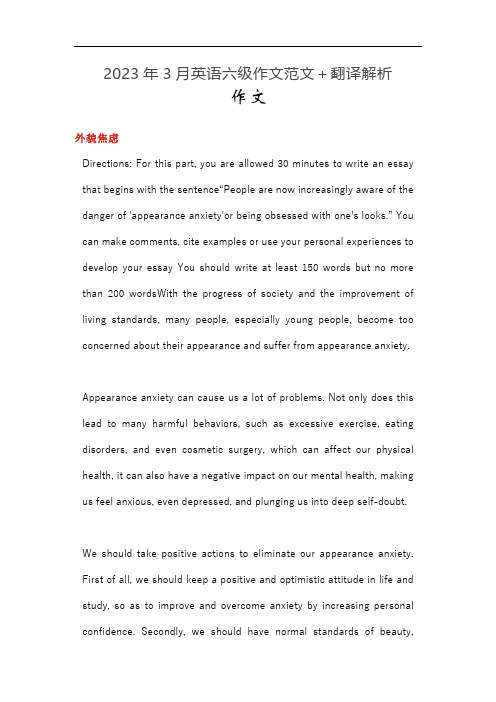
2023年3月英语六级作文范文+翻译解析作文外貌焦虑Directions: For this part, you are allowed 30 minutes to write an essay that begins with the sentence“People are now increasingly aware of the danger of 'appearance anxiety'or being obsessed with one's looks.” You can make comments, cite examples or use your personal experiences to develop your essay You should write at least 150 words but no more than 200 wordsWith the progress of society and the improvement of living standards, many people, especially young people, become too concerned about their appearance and suffer from appearance anxiety.Appearance anxiety can cause us a lot of problems. Not only does this lead to many harmful behaviors, such as excessive exercise, eating disorders, and even cosmetic surgery, which can affect our physical health, it can also have a negative impact on our mental health, making us feel anxious, even depressed, and plunging us into deep self-doubt.We should take positive actions to eliminate our appearance anxiety. First of all, we should keep a positive and optimistic attitude in life and study, so as to improve and overcome anxiety by increasing personal confidence. Secondly, we should have normal standards of beauty,learn to accept our imperfections, and overcome the inferiority and self-doubt brought by looks. Last but not least, we should pay more attention to our inner character instead of superficial external performance.In conclusion, appearance anxiety can adversely affect our physical and mental health. We should take active actions to eliminate appearance anxiety through the above mentioned ways, so that we can enjoy a happier life.面临众多选择时做决定Directions: For this part, you are allowed 30 minutes to write an essay that begins with the sentence “People are now increasingly aware of the challenges in making adecision when faced with too many choices.”You can make comments, cite examples or use your personal experiences to develop your essay. You should write at least 150 words but no more than 200 words.People are now increasingly aware of the challenges in making a decision when faced with too many choices. Especially for students, they often have many different choices before them, and it is indeed a major challenge to make the right choice.For one thing, for most of us, sometimes you can make decisions in an instant, but at other times the choice feels overwhelming. Students may feel anxious when confronted with too many choices and the anxiety may cause a fear of making the wrong choice and later suffering the consequences. This may cause you to hesitate, ruminate, or fail to make any decision at all.For another, some students ,It is easy for them to blindly follow others to make choices without considering whether this choice suits them.As far as I’m concerned,If you are struggling to decide what to do, keep your long-term goals in mind. Start journaling your ideas, and documentyour fears, hopes or expectations so that you have a clear idea of where you are now, and where you want to get to.Keep your goals in mind and explore your options objectively to ensure that you can make the choice that's right for you.数字鸿沟Directions: For this part, you are allowed 30 minutes to write an essay that begins with the sentence "People are now increasingly aware of the 'digital gap' or challenges the elderly face in a digital world. " You can make comments, give explanations or cite examples to develop your essay. You should write at least 150 words but no more than 200 words.People are now increasingly aware of the “digital gap” or challenges the elderly face in a digital world. Digitalization has become a prominent feature of current social changes in our country. Moreover, a worrisome point is that a fair number of the elderly still face the problem of "digital siege", which should attract increasing attention nowadays.Personally speaking, there are two reason accounting for this phenomenon. First and foremost, digital technology is rapidly updated and iterated in a short time so that it is difficult for most elderly people to keep their pace with the trend due to physical and intellectual limitations. In addition, the majority of digital technologies are based on the market needs of young people. Only the aged learn the cumbersome intelligent operation can they be able to apply the technologies, which virtually raises the technical threshold of the oldpeople's digital life.According to statistics, our country is officially entering a moderately aged society. Therefore, we should spare no efforts to help the aged overcome the challenges and enjoy the benefits brought by the digitalization.翻译第一套翻译张骞出使西域【真题】张骞(ZhangQian)是中国第一个伟大的探险家。
英语6级翻译和作文
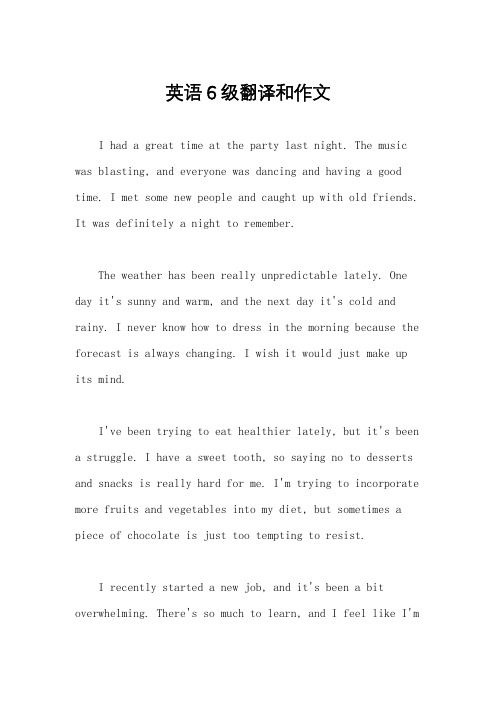
英语6级翻译和作文I had a great time at the party last night. The music was blasting, and everyone was dancing and having a good time. I met some new people and caught up with old friends. It was definitely a night to remember.The weather has been really unpredictable lately. One day it's sunny and warm, and the next day it's cold and rainy. I never know how to dress in the morning because the forecast is always changing. I wish it would just make up its mind.I've been trying to eat healthier lately, but it's been a struggle. I have a sweet tooth, so saying no to desserts and snacks is really hard for me. I'm trying to incorporate more fruits and vegetables into my diet, but sometimes a piece of chocolate is just too tempting to resist.I recently started a new job, and it's been a bit overwhelming. There's so much to learn, and I feel like I'mconstantly playing catch-up. I know it will get easier with time, but right now, it's a lot to take in.I've been thinking about taking a trip somewhere. I need a change of scenery and some time to relax and recharge. I'm not sure where I want to go yet, but I'm looking forward to planning and going on an adventure.。
英语六级20篇翻译、20篇作文
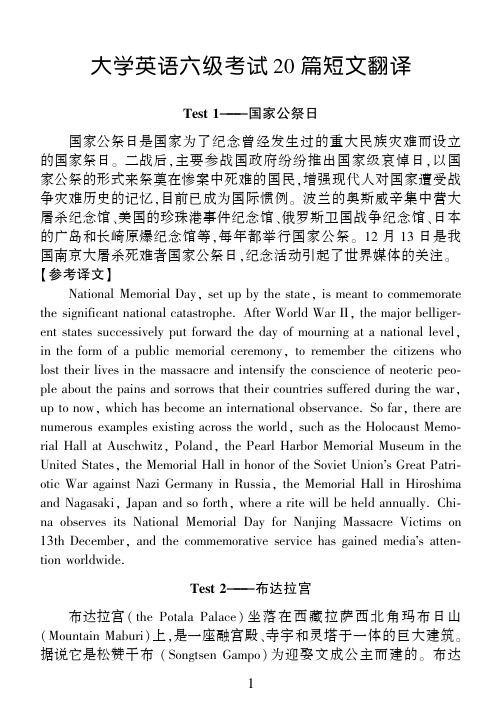
大学英语六级考试20篇短文翻译Test1 国家公祭日国家公祭日是国家为了纪念曾经发生过的重大民族灾难而设立的国家祭日㊂二战后,主要参战国政府纷纷推出国家级哀悼日,以国家公祭的形式来祭奠在惨案中死难的国民,增强现代人对国家遭受战争灾难历史的记忆,目前已成为国际惯例㊂波兰的奥斯威辛集中营大屠杀纪念馆㊁美国的珍珠港事件纪念馆㊁俄罗斯卫国战争纪念馆㊁日本的广岛和长崎原爆纪念馆等,每年都举行国家公祭㊂12月13日是我国南京大屠杀死难者国家公祭日,纪念活动引起了世界媒体的关注㊂ʌ参考译文ɔNational Memorial Day,set up by the state,is meant to commemorate the significant national catastrophe.After World War II,the major belliger-ent states successively put forward the day of mourning at a national level, in the form of a public memorial ceremony,to remember the citizens who lost their lives in the massacre and intensify the conscience of neoteric peo-ple about the pains and sorrows that their countries suffered during the war, up to now,which has become an international observance.So far,there are numerous examples existing across the world,such as the Holocaust Memo-rial Hall at Auschwitz,Poland,the Pearl Harbor Memorial Museum in the United States,the Memorial Hall in honor of the Soviet Union s Great Patri-otic War against Nazi Germany in Russia,the Memorial Hall in Hiroshima and Nagasaki,Japan and so forth,where a rite will be held annually.Chi-na observes its National Memorial Day for Nanjing Massacre Victims on 13th December,and the commemorative service has gained media s atten-tion worldwide.Test2 布达拉宫布达拉宫(the Potala Palace)坐落在西藏拉萨西北角玛布日山(Mountain Maburi)上,是一座融宫殿㊁寺宇和灵塔于一体的巨大建筑㊂据说它是松赞干布拉宫具有鲜明的藏式风格,依山而建,气势雄伟㊂髙115米,共13层㊂主体建筑分红㊁白两宫,红宫居中,白宫居两侧㊂红宫有历代达赖喇嘛(Dalai Lama)的灵塔(coffin tower)和各类佛堂及经堂(scripture shrine);白宫部分是达赖喇嘛处理政务和生活居住的地方㊂布达宫堪称一座建筑艺术与佛教艺术的博物馆㊂ʌ参考译文ɔThe Potala Place,located on the Mountain Maburi in the northwest of Lhasa in Tibet,is a huge building embodying palace,temple and coffin tower.It is said that the Potala Palace was built by Songtsen Gampo for his marriage to Princess Wencheng.The Palace is featured by its distinct Ti-betan style.Built on the mountain,it looks magnificent with115meters high,13floors in total.The main body of the building is divided into the Red Palace and the White Palace,with the former in the middle and the latter on either side.The Red Palace contains coffin towers for all Dalai La-mas in the past dynasties and all kinds of Buddhist temples and scripture shrines.The White Palace is where Dalai Lama works and lives.The Pota-la Palace can be called a museum both of architectural and Buddhist art.Test3 人生我们一生中会犯很多错误㊂这个道理对每个人都适用㊂没有人可以避免㊂但是,有三种错误我们应该尽可能地避免㊂第一种错误是 一直在抱怨 ㊂几乎所有人都这么做,因为抱怨似乎会让我们感觉很好㊂第二种错误是 想把身边的人都比下去 ㊂如果我们非要抓住每个可悲的机会去证明自己比身边的人行,最终只会把自己弄得惨不忍睹㊂第三种错误是 无条件的善良 ㊂无条件的善良与邪恶无异㊂这个世界缺的,是理智㊂ʌ参考译文ɔWe will make a lot of mistakes in our life.This rule works for every-body.No one can be exceptional.But there are three kinds of mistakes we should do our best to avoid.The first kind is to constantly complain. Almost everybody keeps doing it because it seems like complaining makes us feel good.The second kind is to try to outweigh everybody around us.Ifmake ourselves miserable in the end.The third is to be kind without any condition.Kindness without reasoning is the same as evil.What this world doesn t have enough is rationality.Test4 读书好书就像是你最好的朋友㊂它是最有耐心㊁最令人愉悦的伴侣㊂在我们陷入困境或遭遇不幸时,它也不会抛弃我们,而是对我们一如既往地亲切㊂年轻时,好书能陶冶我们的性情,增长我们的知识;年老时,它又给我们以慰藉和鼓励㊂人们常常因为喜欢同一本书而结为知己,就像有时两个人因为敬慕同一个人而成为朋友一样㊂书是真诚而高尚的情谊纽带㊂人们可以通过共同喜爱的作家沟通思想,交流感情,彼此息息相通㊂ʌ参考译文ɔGood books may be our best friends.They are the most patient and cheerful companions.They will never turn their back upon us when we are suffering from adversity or distress,but always show us the same kindness. When we are in youth,a good book cultivates our temper and increases our knowledge;when we are in age,it consoles us and encourages us.Men of-ten discover their affinity to each other by the mutual love they have for a book just as two persons sometimes discover a friend by the admiration of a third.Books are sincere and lofty bonds of friendship.Men can exchange ideas,communicate feelings and sympathize with each other through their favorite author.Test5 选择我们无法选择出生,无法选择成长的周遭环境,也无法选择死亡㊂但是在这些无法选择之中,我们却可以选择自己的生活方式:是勇敢无畏还是胆小怯懦,是光明磊落还是厚颜无耻,是目标坚定还是随波逐流㊂我们可以决定生活中哪些至关重要,哪些微不足道㊂而能够显示我们自身重要性的,是我们做了什么㊂当我们做决定和选择时,我们的生活便得以形成㊂ʌ参考译文ɔour way of death.But within all the choicelessness,we can choose how we shall live:courageously or cowardly,honorably or dishonorably,with pur-pose or in drift.We can decide what is important and what is trivial in life. It is what we decide to do that makes us significant.We decide and choose,so are our lives formed.Test6 皮影戏皮影戏(Shadow Play)已经有至少2000多年的历史㊂皮影戏,是一种用蜡烛或燃烧的酒精等光源照射兽皮或纸板做成的人物剪影以表演故事的民间戏剧㊂表演时,艺人们在白色幕布后面,一边操纵影人偶,一边用当地流行的曲调讲述故事(有时用方言),同时配以打击乐和弦乐㊂在过去还没有电影㊁电视的年代,皮影戏曾是十分受欢迎的民间娱乐活动之一㊂2011年,中国皮影戏入选世界非物质文化遗产代表作名录㊂ʌ参考译文ɔShadow play has a history of more than2,000years.Shadow Play is a kind of folk drama,in which light sources such as candles or burning alco-hol are used to illuminate the silhouettes,which are made of animal skins or paper boards,to perform a story.During the performance,the artisans handle the puppets while telling stories in popular local tunes(or in dia-lects)behind the white curtain,accompanied with percussion music and string music.In the old days,when there was no movie or TV,shadow play was one of the most popular folk recreational activities.In2011, China s shadow play was selected into the World Non-material Cultural Her-itage List.Test7 ‘琅琊榜“影评‘琅琊榜“由曾打造过多部优质剧的山东影视传媒集团制作,旨在向观众传达友情㊁忠诚㊁责任等宝贵的理念,致力于打造一部具有史诗品格与正剧品质的古装剧㊂本剧投资过亿,制作精良,文戏细腻缜密,武戏恢宏壮观㊁精工细作㊂该剧密雨惊风,以独特的水墨素描之法㊁力图展现磅礴大气而又不失诗意的精美画面,引领开拓国内古装剧新潮,打造古装剧新标杆㊂ʌ参考译文ɔNirvana in Fire was produced by Shandong Film and TV Group,which has made quite a few appealing and popular TV series,aiming at conveying the sense of friendship,loyalty and responsibility,which are cherished throughout history,and committing itself to creating a costume drama with an epical style as well as a serious drama quality.This TV series boasts an investment of over RMB100million,produced excellently both in quiet and military plays,with the former being exquisite and meticulous and the latter magnificent and spectacular.The only thing that is not uncommon in the play is the craftsmanship.In addition to the fact that it has a compact structure,Nirvana in Fire strives to display the fine scenes monumental yet poetic via the unique ink painting sketch technique,ushering us into a new era of costume dramas at the domestic market and acting as a new guidepost for its peers and counterparts.Test8 感激与富足感激与富足,是一根骨头的两端,两者合并,便会产生奇迹,构筑成功㊂感激是让你在当下感到富足的基础㊂当你热爱自己㊁热爱你所做的事㊁热爱你拥有的东西时,你的能量就会改变,你会开始成长㊂人们会被你吸引,因为这种感激散发的正能量在当今的文化里是不可多得的㊂我很希望能把它带回到我们的文化中㊂我希望感激可以如泉涌般流遍世界,这样我们就可以互相启发,活出最富足的人生㊂ʌ参考译文ɔGratitude and plentitude are the two ends of the same -bined,they r e the marrow of miracles and the structure of success.Grati-tude grounds plentitude now.When you honor who you are,what you do, and what you have,your energy will change.You will start to glow.People will be drawn to you because that gratitude glow is rare in our current cul-ture.I m hoping to bring it back to our culture.It s my desire to kick off a gratitude cascade throughout the world so that we may inspire each other to live our best lives yet.Test9 远离消耗你的人那么,生活中有哪些是消耗你的人呢?1.时常抱怨,负能量满满㊂2.不守时间㊁不守承诺,斤斤计较㊂3.情绪多变㊁悲观㊁恐惧,喜欢八卦㊂4.自私自利,不懂感恩㊂如何远离消耗你的人?对于自己不喜欢的要求,坚决说 不 ㊂保持清醒,多跟积极的人交朋友㊂一旦发现自己正在被消耗,及时止损㊂生命是宝贵的,我们都要在有限的生命里去做有意义的事情!ʌ参考译文ɔThen,what traits do those persons consuming you take possession of?plain frequently and full of negative power and emotion.2.Unpunctual,lose one s word,and be preoccupied by immediate in-terests.3.Sentimental,pessimistic,cowardly timid and fond of gossiping.4.Egoistic and ungrateful.How to keep away from those depleting you?As for the requirements you dislike,refuse them with a firm NO! Keep calm and communicate more with positive and sunny ones. Once finding that you are being consumed and depleted,promptly curb it. One s life is precious and he or she should do the meaningful things within the limited lifespan!Test10 敦煌壁画敦煌壁画是敦煌艺术的主要组成部分,规模巨大,技艺精湛㊂敦煌壁画的内容丰富多彩,它和别的宗教艺术一样,是描写神的形象㊁神的活动㊁神与神的关系㊁神与人的关系以寄托人们善良的愿望,安抚人们心灵的艺术㊂因此,壁画的风格,具有与世俗绘画不同的特征㊂但是,任何艺术都源于现实生活,任何艺术都有它的民族传统㊂因而它们的形式多出于共同的艺术语言和表现技巧,具有共同的民族风格㊂ʌ参考译文ɔDunhuang Frescoes,the main component of Dunhuang Arts,is gigan-tic and exquisite,with rich and colorful contents.It is a kind of art that de-picts the god s image and activities,the relationships among gods and be-tween gods and human beings to express people s good wishes and console people s souls,just the same as other religious arts.Accordingly,the style of the frescoes is different from secular paintings.However,any kind of art stems from real life and bears its own national tradition.So the forms of all arts come out of common art language and expression techniques and have common nation style.Test11 恐怖主义恐怖主义是实施者对非武装人员有组织地使用暴力或以暴力相威胁,通过将一定的对象置于恐怖之中,来达到某种政治目的的行为㊂国际社会中某些组织或个人采取绑架㊁暗杀㊁爆炸㊁空中劫持㊁扣押人质等恐怖手段,企求实现其政治目标或某项具体的要求㊁主张和行动㊂恐怖主义事件主要是由极左翼和极右翼的恐怖主义团体,以及极端的民族主义㊁种族主义的组织和派别所组织策划的㊂ʌ参考译文ɔTerrorism is a behavior that the executors use violence against the un-armed in an organized way or threaten them by means of violence,through putting certain objects in panic,to achieve their political objectives.Some organizations or individuals in the international community adopt kidnap-ping,assassination,explosion,aerial hijack,retention of the hostages and other terroristic means in order to realize their political goals or specific re-quirements,claims and actions.Terrorism is mainly schemed and plotted by the far left and far right terrorist groups,factions and organizations of ex-treme nationalism and racism.Test12 共享经济共享经济正在中国急速发展㊂中国本土的汽车共享和房屋共享企业是在这个十年之初出现的,即在优步公司(Uber)和爱彼迎公司美元㊂近几个月来,共享单车在中国已成为风险资本最关注的目标之一㊂在中国许多经济领域正在减速或陷入停滞之际,预计中国的共享经济到2020年时将在国内生产总值中占到10%的份额㊂由于资金被浪费㊁企业合并或破产的大环境,共享模式在中国比在几乎其他任何地方看起来都拥有更加光明的未来㊂ʌ参考译文ɔThe sharing economy is booming in China.Homegrown ride-sharing and home-sharing companies emerged in China early this decade,shortly after Uber Inc.and Airbnb unched in the U.S.Chinese sharing companies raised almost$25billion last year.Bike sharing has been one of the country s most visible destinations for venture capital over the last few months.Even as much of the Chinese economy is slowing or stalling,it s estimated that China s sharing economy will account for10%of GDP by 2020.Since money is wasted and companies merge or go bust,the sharing model looks to have a brighter future in China than almost anywhere else.Test13 一带一路一带一路 (the Belt and Road)是 丝绸之路经济带 和 21世纪海上丝绸之路 的简称㊂它将充分依靠中国与有关国家既有的双多边机制,借助既有的㊁行之有效的区域合作平台㊂一带一路旨在借用古代丝绸之路的历史符号,高举和平发展的旗帜,积极发展与沿线国家的经济合作伙伴关系,共同打造政治互信㊁经济融合㊁文化包容的利益共同体㊁命运共同体和责任共同体㊂ʌ参考译文ɔThe Belt and Road is short for the Silk Road Economic Belt and the 21st-Century Maritime Silk Road.It will fully depend on the bi-lateral and multi-lateral mechanism between China and its related nations with the help of existing and effective regional cooperation platforms.It aims to use the historic symbol of the ancient Silk Road,raise the flag of peace and devel-opment,and develop the economic partnership with nations along the line positively,in order to build a community of interests with trustful politics, integrated economy and inclusive culture,a community with a shared fu-Test14 银发产业银发产业 是一个新名词,是指以老年人为目标客户的产业㊂其范围十分广泛,包括健康服务㊁家政服务㊁旅游娱乐和教育等各个领域㊂随着中国进入老龄化社会,银发产业蓬勃发展㊂老年人出游人数逐年增长㊂越来越多的老年人选择在退休后进入老年大学学习㊂相关统计数据表明,全国60岁以上的老人超过了总人口的11%㊂目前, 银发产业 市场需求达到8000亿元左右,产业还有很大的发展空间㊂ʌ参考译文ɔSilver industry is a new industry aiming at the senior citizens.The sil-ver industry covers a very extensive range of fields,including health serv-ice,household service,traveling and entertainment,education and so on. As China is stepping into the aging society,the silver industry develops fast.An increasing number of senior citizens go traveling every year,and more and more old people choose to study in the universities for the elderly after their retirement.According to the relevant statistics,more than11% of the whole population are senior citizens aged older than60.At present, the silver industry still has a large development room,for the market de-mand for it equals about800billion RMB.Test15 妇女的婚姻观妇女生活方式的重要变化才刚开始对她们的经济地位发挥全方位的影响㊂就在前几年,多数女孩会趁早离开学校并找一份全职工作㊂但当她们结婚后,她们通常会立马离职并且不会返岗㊂现在的离校年纪是16岁,许多女孩选择在学校继续深造㊂虽然很多妇女会尽可能地早结婚,但是许多已婚妇女仍会保持工作直到她们的第一个小孩出生㊂许多妇女生完小孩之后仍会全职或者兼职地工作㊂这些变化导致了婚姻中新型关系的出现:丈夫承担较多的责任并对家庭生活感到更满意,夫妻之间更多的是依据他们自身的能力和兴趣来平等地操持和经营家庭㊂ʌ参考译文ɔThe important change in women s life pattern has only begun to havegirls left school at the first opportunity and most of them took a full-time job.However when they married,they usually left work at once and never returned to it.Today the school leaving age is16,many girls stay at school after that age.Though many women tend to marry younger at every opportu-nity at the earliest,more married women stay at work at least until their first children are born.Very many more afterwards return to full-time or part-time work.Such changes have led to a new relationship in marriage, the husband taking a greater share of the duties and his being more satisfac-tory with family life,and both the husband and wife sharing more equally in providing the money and running the home according to their abilities and interests of each of them.Test16 霍桑霍桑是美国的著名作家,他写了很多优秀的作品,在国内外读者当中深受欢迎㊂霍桑主要生活在19世纪,当时清教主义盛行,并且对人们有相当大的影响力,清教主义与加尔文主义有很多相近之处,比如对原罪论的理解,对救赎论的理解等㊂因此,在某种程度上加尔文主义可以近似地理解为清教主义㊂霍桑的祖先是严格奉行清教主义的著名人物,并且他们做了很多耸人听闻的迫害异教徒的事情㊂为此,霍桑感到很有罪恶感㊂他认为人性本恶,这种罪是与生俱来的㊂当时的社会大环境,个人的身世背景和经历,这两个因素共同影响着一个作家的写作主题和风格㊂ʌ参考译文ɔHawthorne is a famous American writer.He wrote many excellent no-vels,which are popular among the readers at home and abroad.He lived in 19th century when Puritanism was still prevailing and it exerted a quite great influence on people.The doctrines of Calvinism have overlapped meanings with Puritanism,such as the concept of the original sin,atone-ment and so on.Therefore,to some extent,Calvinism can be approxima-tively seen as Puritanism.Hawthorne s family members were strict followers of Puritanism and they did numerous lurid persecution of heretics.Conse-quently,he felt deeply guilty.He believed that man was born with sin andwriter s background and experience both can account for the writer s themes and writing style.Test17 低碳经济面对日益严重的环境问题,低碳经济越来越引起世界各国的关注㊂对于低碳经济的界定虽各有不同,但有一点是没有争议的㊂人们普遍承认,低碳经济是以低能耗㊁低污染㊁低排放为基础的经济模式,是人类社会继农业文明㊁工业文明之后的又一次重大进步㊂低碳经济实质上是能源高效利用㊁清洁能源开发㊁追求绿色GDP的问题,核心是能源技术和减排技术创新㊁产业结构和制度创新以及人类生存发展观念的根本性转变㊂在我国经济发展的关键时期,更加协调低碳经济与发展的关系,保护地球的生态环境,事关中国人民乃至全世界人民的福祉㊂ʌ参考译文ɔDue to the increasingly serious environmental problems,low-carbon economy attracts more and more attention of the countries all over the world.For all the definition of low-carbon economy is different,one thing is not controversial.It is widely acknowledged that low-carbon economy is an economical model based on low energy consumption,low pollution and low emission,a major progress of human society following agriculture civili-zation,industrial civilization.In essence,low-carbon economy is efficient use of energy,development of clean energy and pursuit of green GDP, whose core is the innovation of energy technology and emission reduction technology,the innovation of industrial structure and system innovation, and the fundamental shift of human s survival and development ideas.In the critical period of economic development of our country,to further coor-dinate the relationship between low-carbon economy and the development, and to protect the ecological environment of the earth,are about the well-being of the Chinese people and the people all over the world as well.Test18 和平自古以来,和平就是人类最持久的夙愿㊂和平像阳光一样温暖㊁像雨露一样滋润㊂有了阳光雨露,万物才能茁壮成长㊂有了和平稳定,人类才能更好地实现自己的梦想㊂历史告诉我们,和平是需要争11取的,和平是需要维护的㊂只有人人都珍惜和平㊁维护和平,只有人人都记取战争的惨痛教训,和平才是有希望的㊂历史是最好的老师,它忠实记录下每一个国家走过的足迹,也给每一个国家未来的发展提供启示㊂中国人历来讲求 己所不欲,勿施于人 ㊂中国需要和平,就像人需要空气一样,就像万物生长需要阳光一样㊂ʌ参考译文ɔSince time immemorial,peace has been people s most enduring aspira-tion.Peace is as warm as sunshine and as moist as rain and dew with which all things on earth could thrive.Only with peace and stability can human beings realize their dreams better.Historical experience tells us that peace needs to be striven and safeguarded.The world will be peaceful,only when everyone cherish and maintain it and always remember painful lessons of the war.History is the best teacher who keeps a fair record of the paths that all countries have traveled and provides enlightenment for their future develop-ment.Chinese people are particular about Don t do to others what you don t want others to do to you all long.Peace is to China what air is to people as well as sunshine is to all things growing.Test19 微信微信(WeChat)作为时下最热门的社交信息平台,是一个为智能终端提供即时通讯服务的免费应用程序㊂微信支持单人㊁多人参与,人们通过手机网络发送语音㊁图片㊁视频和文字㊂截止到2015年第一季度,微信已经覆盖中国90%以上的智能手机,月活跃用户达到5.49亿,用户覆盖200多个国家㊁超过20种语言㊂此外,各品牌的微信公众账号总数已经超过800万个,微信支付用户则达到了4亿左右㊂ʌ参考译文ɔWeChat,the hottest social information platform at present,is a free app to provide instant messages for intelligent terminals.It supports both one-player and multiplayer participation.People can send voices,pictures, videos and words through mobile network.WeChat has covered more than 90%of the Chinese smart mobile phones by the end of the first quarter of 2015,and has549million monthly active users coming from over200coun-21tries with more than20kinds of languages.What s more,the total number of WeChat public accounts with various bands is more than8million,and the number of WeChat payment users has reached400million or so.Test20 温泉温泉的水温㊁流动时产生的机械冲击作用和水中所含丰富的矿物质成分使其具有了独特的保健功效㊂泡温泉不仅可以放松身心㊁消除疲劳㊁松弛神经㊁缓解压力,还可润滑肌肤㊁安神养颜㊁加速血液循环㊁促进人体新陈代谢,有利于人体健康㊂据健康专家分析,泡温泉对现在脑力劳动者的 亚健康 (sub-health)状态有较为明显的疗效,并将泡温泉与劳逸结合㊁进行有氧运动并列为预防㊁消除 亚健康 状态的三大良好生活习惯㊂ʌ参考译文ɔThe mechanical shock effect made by the water flows,together with the water temperature and the abundant mineral substances in the water, endows the hot spring with unique healthgiving benefits.Bathing in the hot spring can help you relax,eliminate fatigue,calm your nerves,relieve your pressure,lubricate your skins,relieve your uneasiness,maintain your beauty,accelerate your blood circulation,and enhance your metabolism. Based on an analysis of health experts,bathing in the hot spring has an ob-vious effect on the mental workers who are in the state of sub-health.And, together with Fatigue and Rest and Aerobic Exercise , Bathing in the hot spring has been listed as one of the three good living habits for preven-ting and eliminating the state of sub-health.31大学英语六级考试20篇作文预测预测1 成功与运气Directions:For this part,you are allowed30minutes to write an essay ex-plaining whether hard work or good luck plays a vital role inthe way to success.You can give examples to illustrate yourpoint.You should write at least㊀150㊀words but no more than㊀200㊀words.ʌ参考范文ɔSome people say that no matter how hard they have worked,they just couldn t gain success.Consequently,they complain that they don t have the good luck that is essential to success.Is it really the case?At first thought, it seems reasonable,but upon careful thinking,it just doesn t make sense. Why I say so is based on the following.On the one hand,if you do not work hard,good luck cannot help you in the way to success.For instance,if you want to get a high score in CET-6,you have to memorize words,study grammar,practice listening,read-ing,translating and writing and do past exam papers and exercises.If you just want to depend on good luck instead of doing the above things,it is im-possible for you to score high in CET-6.On the other hand,good luck just plays a boosting role while hard work is the foundation stone in the way to success.To conclude,it is hard work that plays a vital role in the way to suc-cess and therefore we should depend on hard work rather than luck to gain success.预测2 智商与情商Directions:For this part,you are allowed30minutes to write an essay com-menting on the topic While IQ gets you hired,EQ gets you pro-moted. You can cite examples to illustrate your point.You shouldwrite at least㊀150㊀words but no more than㊀200㊀words.41ʌ参考范文ɔWhile IQ gets you hired,EQ gets you promoted.That means that EQ is more important than IQ in the career life.It is reported that a higher sta-tus the leader is in,the more his EQ contributes.That s the reason why among many employees,who have the same educational background and the same capacity,the speed of promotion is different.The one with higher EQ well knows how to get along with others and how to control his negative emotion.A report says that the emotional quo-tient of top leaders in the companies is very high.According to the ad-vanced management concept,leadership skills are not about dominating or controlling employees,but convincing others to strive for one common goal. Under the working pressure,if one could not control his emotion or know other colleagues feelings,negative effects may be caused.As mentioned above,EQ is very important in the career life.There are several suggestions to improve EQ.First,you should know yourself well and control your emotions.Second,you should encourage yourself,espe-cially in difficult time.Third,you should learn to observe others feelings and how to get along with them.预测3 低碳生活Directions:For this part,you are allowed30minutes to write a short essay on low carbon life.You are required to write at least150wordsbut no more than200words.51ʌ参考范文ɔAs is shown above,in the middle of the drawing exists a boy,being pulled forward by his pet dog while standing on a skateboard.Reportedly, the great concern among the public has been aroused by this picture,which is thought-provoking.The absence of environmental protection has triggered significant hid-den issues that are usually ignored in our daily lives.First of all,the ways people think about environmental protection are largely determined by their degrees of education.Those with low levels of education may be easily sat-isfied by their instant interests,which fosters the lack of environmental pro-tection awareness as a lifestyle.Furthermore,with the accelerating progress of economic development,increasing amounts of time and energy are spent on work,leaving insufficient time for people to reflect upon the environment protection.Therefore,the environmental protection deficiency may be easi-ly overlooked,even when it occurs around people.To sum up,people have neglected their shortcomings for a long time,which is the major reason be-hind the emergence of the phenomenon of the insufficiency of environmental protection.With the huge success of the19th CPC National Congress,our nation has not only enhanced the enforcement of the relevant laws with regard to environmental protection but also improved the consciousness of environ-mental protection on a national scale.And young people are encouraged to cultivate the good habit of protecting the environment and make endeavors to change their lives to spare any future regret.预测4 大学生使用信用卡Directions:For this part,you are allowed30minutes to write a short essay on students use of credit cards.You are required to write at least㊀150㊀words but no more than㊀200㊀words.ʌ参考范文ɔNowadays,credit cards have been increasingly popular on campus in that banks are growingly paying their attention to students and laying out various policies to cater for students need.People hold different views61towards students owning credit cards.As far as I am concerned,it should be cautious for students to keep credit cards.Students need to be calm and wise when applying for or using credit cards.There are latent risks associated with credit cards.Some students find it quite easy to exceed their budget.They are tempted to purchase goods that they do not really need,and can become quickly overburdened by debt.The credit cards often charge a high rate of interest,which exacer-bates the problems for these people.And in the long run,this irresponsible and irrational consumption behavior will be impeditive for students to devel-op into a good consumption habit.On the other hand,when in emergency circumstances,credit cards will play its role and save you bothering relatives or friends.Credit cards can temporarily relieve your financial burden.Minimum repayment or amor-tization is a preferred alternative when you are strapped for cash.预测5 网络言论自由Directions:For this part,you are allowed30minutes to write an essay on the topic free speech on the Internet.You must give sound ar-guments to support your point of view.You should write at least㊀150㊀words but no more than㊀200㊀words.With the popularization of the Internet,it has become a common phe-nomenon that people express their ideas freely on the Internet.However, there are different voices on whether free speech should be advocated on the Internet.Some people agree that everyone should be allowed to share his or her ideas freely on the Internet.They say that since we live in a democratic country,we all have the right to free speech. However,other people argue that restrictions should be imposed on the expressions on the Internet,for there have been many remarks that spread false information and messages of violence,which has a bad influence on teenagers.In my opinion,people should be endowed with the right to speak freely on the Internet as long as we improve our moral consciousness.Internet is a71。
12月英语六级翻译原文及解析
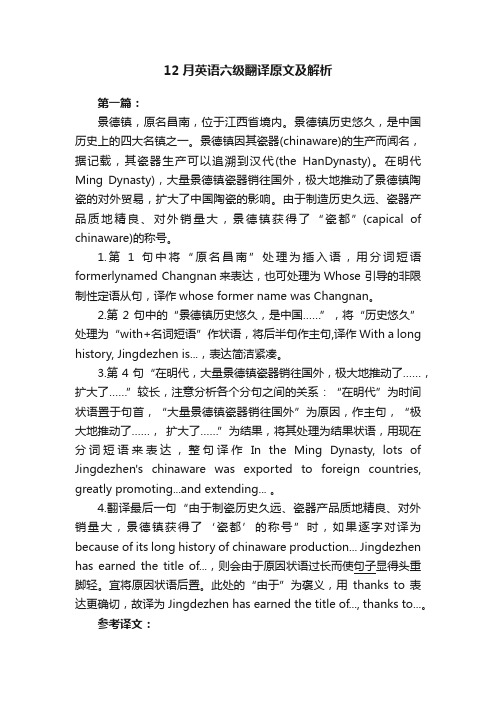
12月英语六级翻译原文及解析第一篇:景德镇,原名昌南,位于江西省境内。
景德镇历史悠久,是中国历史上的四大名镇之一。
景德镇因其瓷器(chinaware)的生产而闻名,据记载,其瓷器生产可以追溯到汉代(the HanDynasty)。
在明代Ming Dynasty),大量景德镇瓷器销往国外,极大地推动了景德镇陶瓷的对外贸易,扩大了中国陶瓷的影响。
由于制造历史久远、瓷器产品质地精良、对外销量大,景德镇获得了“瓷都”(capical of chinaware)的称号。
1.第1句中将“原名昌南”处理为插入语,用分词短语formerlynamed Changnan来表达,也可处理为Whose 引导的非限制性定语从句,译作whose former name was Changnan。
2.第2句中的“景德镇历史悠久,是中国……”,将“历史悠久”处理为“with+名词短语”作状语,将后半句作主句,译作 With a long history, Jingdezhen is...,表达简洁紧凑。
3.第4句“在明代,大量景德镇瓷器销往国外,极大地推动了……,扩大了……”较长,注意分析各个分句之间的关系:“在明代”为时间状语置于句首,“大量景德镇瓷器销往国外”为原因,作主句,“极大地推动了……,扩大了……”为结果,将其处理为结果状语,用现在分词短语来表达,整句译作In the Ming Dynasty, lots of Jingdezhen's chinaware was exported to foreign countries, greatly promoting...and extending... 。
4.翻译最后一句“由于制瓷历史久远、瓷器产品质地精良、对外销量大,景德镇获得了‘瓷都’的称号”时,如果逐字对译为because of its long history of chinaware production... Jingdezhen has earned the title of...,则会由于原因状语过长而使句子显得头重脚轻。
优秀英语六级作文及翻译(精选)

优秀英语六级作文及翻译(精选)At present, many people take it for granted that fresh water will never be used up because we can find it not only from the rain, but also in the rivers, lakes and wells. Consequently, itis not necessary for us to worry about global shortage of fresh water.We should take urgent measures to protect fresh water resources. The government should increase the efficiency ofwater usage by such methods as water recycling and purificationof sea water. The people, on the other hand, should form thehabit of cherishing every drop of water. Last but not least, pollution must be effectively controlled, if we ever want to improve the quality of life.目前,许多人认为淡水是取之不尽的,我们可以不仅可以从雨中得到它,而且在河流,湖泊就像威尔斯湖泊那里得到它。
因此,我们不用担心全球淡水短缺的必要性。
事实上,情况已经变得如此严重以至于每个人都应该知道它并立即采取行动。
随着世界人口的逐年增加,水资源正在以惊人的速度消耗。
更重要的是,随着科学技术的发展,现代工业需要更多的水资源。
六级真题作文和翻译
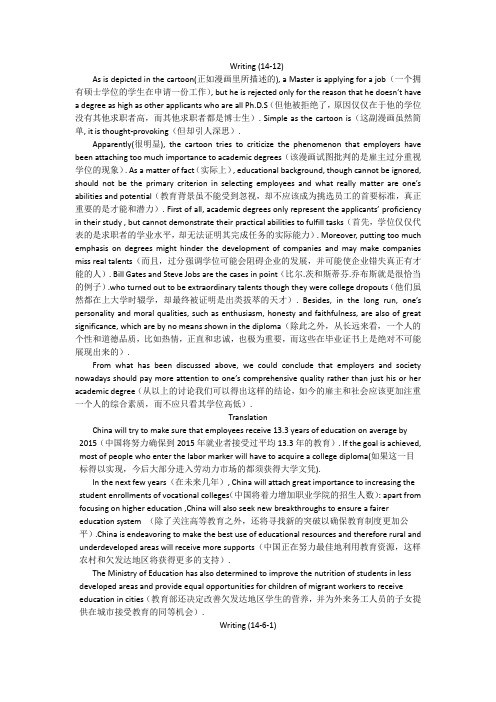
Writing (14-12)As is depicted in the cartoon(正如漫画里所描述的), a Master is applying for a job(一个拥有硕士学位的学生在申请一份工作), but he is rejected only for the reason that he doesn’t have a degree as high as other applicants who are all Ph.D.S(但他被拒绝了,原因仅仅在于他的学位没有其他求职者高,而其他求职者都是博士生). Simple as the cartoon is(这副漫画虽然简单, it is thought-provoking(但却引人深思).Apparently(很明显), the cartoon tries to criticize the phenomenon that employers have been attaching too much importance to academic degrees(该漫画试图批判的是雇主过分重视学位的现象). As a matter of fact(实际上), educational background, though cannot be ignored, should not be the primary criterion in selecting employees and what really matter are one’s abilities and potential(教育背景虽不能受到忽视,却不应该成为挑选员工的首要标准,真正重要的是才能和潜力). First of all, academic degrees only represent the applicants’ proficiency in their study , but cannot demonstrate their practical abilities to fulfill tasks(首先,学位仅仅代表的是求职者的学业水平,却无法证明其完成任务的实际能力). Moreover, putting too much emphasis on degrees might hinder the development of companies and may make companies miss real talents(而且,过分强调学位可能会阻碍企业的发展,并可能使企业错失真正有才能的人). Bill Gates and Steve Jobs are the cases in point(比尔.茨和斯蒂芬.乔布斯就是很恰当的例子).who turned out to be extraordinary talents though they were college dropouts(他们虽然都在上大学时辍学,却最终被证明是出类拔萃的天才). Besides, in the long run, one’s personality and moral qualities, such as enthusiasm, honesty and faithfulness, are also of great significance, which are by no means shown in the diploma(除此之外,从长远来看,一个人的个性和道德品质,比如热情,正直和忠诚,也极为重要,而这些在毕业证书上是绝对不可能展现出来的).From what has been discussed above, we could conclude that employers and society nowadays should pay more attention to one’s comprehensive quality rather than just his or her academic degree(从以上的讨论我们可以得出这样的结论,如今的雇主和社会应该更加注重一个人的综合素质,而不应只看其学位高低).TranslationChina will try to make sure that employees receive 13.3 years of education on average by 2015(中国将努力确保到2015年就业者接受过平均13.3年的教育). If the goal is achieved, most of people who enter the labor marker will have to acquire a college diploma(如果这一目标得以实现,今后大部分进入劳动力市场的都须获得大学文凭).In the next few years(在未来几年), China will attach great importance to increasing the student enrollments of vocational colleges(中国将着力增加职业学院的招生人数): apart from focusing on higher education ,China will also seek new breakthroughs to ensure a fairer education system (除了关注高等教育之外,还将寻找新的突破以确保教育制度更加公平).China is endeavoring to make the best use of educational resources and therefore rural and underdeveloped areas will receive more supports(中国正在努力最佳地利用教育资源,这样农村和欠发达地区将获得更多的支持).The Ministry of Education has also determined to improve the nutrition of students in less developed areas and provide equal opportunities for children of migrant workers to receive education in cities(教育部还决定改善欠发达地区学生的营养,并为外来务工人员的子女提供在城市接受教育的同等机会).Writing (14-6-1)The saying that “men cannot be judged by their appearance” often reminds me of the proverb that “a book should never be judged by its cover,”(“不可以貌取人”这个说法经常让我想起“不可依据封面判断一本书的好坏”). both indicating that external appearance is unreliable and sometimes can be misleading(这两句话都表明外表并不可靠,有时还会误导人). The saying also tries to convey that in order to truly know a person, we need to go beyond their looks and focus on more profound aspects(这种说法还试图传达这样一个信息,即为了真正了解一个人,我们需要超越外表,关注其更为深刻的方面).Admittedly, attractive appearance is of significance and can be an advantage(诚然,富有魅力的外表很重要,也可以是一种优势). However, what really matters is one’s quality and ability, which can create values for people and society(然而,真正重要的是一个人的品质和能力). There are numerous examples of outstanding people with remarkable achievements who are just plain-looking(外貌平凡却取得了非凡成就的杰出人物不胜枚举). A good case in point is Stephen Hawking(斯蒂芬霍金就是一个很好的例子). He is crippled but has made great contributions to the world and become one of the greatest contemporary scientists(他虽身患残疾,却为世界做出了伟大的贡献,成为当代最伟大的科学家之一). Moreover(此外), with the advancement of technology(随着技术的发展), one’s appearance can be easily changed through plastic surgeries(人的外貌能够通过整容轻易地改变), but abilities can only be obtained through years of self-cultivation(但能力却只能通过长年累月的自我培养才能获取). Last but not least, it’s one’s quality and ability that last while good looks fade over time (最后但同样重要的一点是,只有品质和能力能够长久存在,美丽的外貌会随着时间的推移而逝去).To conclude, judging a person by his or her appearance is superficial and undependable(总之,以貌取人是肤浅和不可靠的). A better standard is to judge one by what good he or she does to the world and humans(更好的判断标准是他们为世界和人类带来里什么好处).TranslationBeijing has planned to invest 760 billion yuan to tackle pollution in the coming three years(北京计划未来三年投资7,600 亿元治理污染), starting from reducing the PM2.5 emissions(从减少PM2.5开始). The newly released plan is aimed at reducing four major pollution sources(这一新公布的计划旨在减少四种主要污染源), including the exhaust emissions from more than 5 million motor vehicles, the burning of goals in the surrounding areas, the sandstorms from the North and the local construction dusts(包括500多万辆机动车的尾气排放、周边地区燃煤、来自北方的沙尘暴和本地的建筑灰尘). Another 85 billion yuan will be used to build or upgrade the facilities for treatment of urban garbage and sewage and additional 30 billion yuan will be invested in forestation in the next three years(另有850 亿元用于新建或升级垃圾处理和污水处理设施,加上300 亿元投资未来三年的植树造林).The municipal government also plans to set up a group of water recycling factories and curb peccancy buildings in order to improve the environment(市政府还计划建造一批水循环利用工厂,并制止违章建筑,以改善环境). In addition, Beijing will punish more severely the behaviors that violate the regulations of emission limitation(另外,北京还将更严厉地处罚违反限排规定的行为).Writing (14-6-2)Living in an age when information explodes and the pace of life becomes increasingly rapid (生活在一个信息大爆炸和生活节奏不断加快的时代), people may gradually lose their rational thinking and judgment and tend to draw a hasty conclusion upon seeing or hearing something(人们可能会丧失其理性思考和判断,往往会在一看到或听到某件事情的时候,就得出草率的结论). However , what is seen or heard can be quite deceptive and misleading(然而,所见所闻可能会颇具欺骗性和误导性).In fact, numerous examples can be enumerated in our daily life(事实上,在我们的日常生活中这样的例子不胜枚举). for instance, beggars in rags that look miserable can be easily seen nowadays, but it turns out that many of them are professional ones and it is astonishing to learn they go to luxury shops after their “work” of the day , smartly dressed(比如,如今我们很容易看到衣衫褴褛、看似悲惨的乞丐,但其实他们中的很多人是职业乞丐,他们在一天的“工作”后,会去逛奢侈品商店,且衣着光鲜,这令人震惊不已). Another case in point is like this : a mother came to her son with two apples, telling her son to choose one , but the son quickly took a bite of the both(另一个恰当的例子是一位母亲拿着两个苹果走到他儿子的身边,让他选择其中的一个,但他儿子却迅速在两个苹果上都咬了一口。
英语六级写作范文及译文
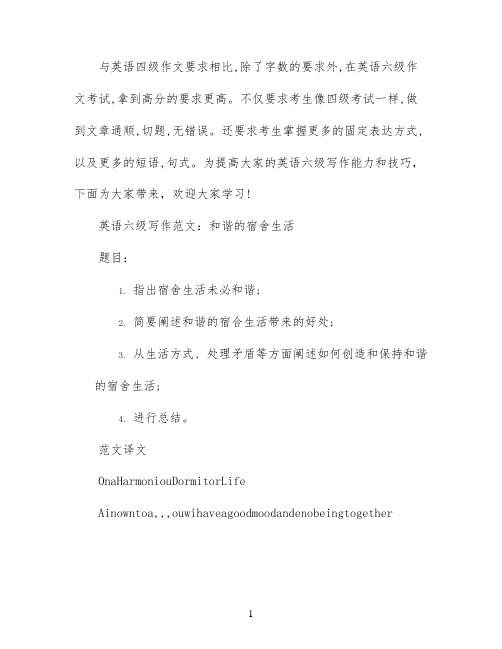
与英语四级作文要求相比,除了字数的要求外,在英语六级作文考试,拿到高分的要求更高。
不仅要求考生像四级考试一样,做到文章通顺,切题,无错误。
还要求考生掌握更多的固定表达方式,以及更多的短语,句式。
为提高大家的英语六级写作能力和技巧,下面为大家带来,欢迎大家学习!英语六级写作范文:和谐的宿舍生活题目:1.指出宿舍生活未必和谐;2.简要阐述和谐的宿合生活带来的好处;3.从生活方式、处理矛盾等方面阐述如何创造和保持和谐的宿舍生活;4.进行总结。
范文译文OnaHarmoniouDormitorLifeAinowntoa,,,ouwihaveagoodmoodandenobeingtogether,ouhavetoevauateourifeteandtrtogetridofourbadhabit,,w henanannoingituationarie,ou',ou'havetoharewitheachotheran dmaegoodfriendInconcuion,ouhoudmaeeverefforttobuidaharmonioudormito rifefortheaeofgoodtudandgoodife和谐的宿舍生活宿合生活是大学生活中不可缺少的一部分。
但有时宿舍的和谐会以这样或那样的方式所打破。
众所周知,和谐的宿舍生活对大学生很重要,会让所有成员受益。
在一方面,你能够休息好,全身心投入学习。
在另一方面,你也会心情好,彼此相处愉快。
有几种方法可以用来创造和保持和谐的大学生活。
首先,你需要评估你的生活方式,如果有不良习惯的话要改掉。
其次,当不愉快的状况出现时,你要学会容忍彼此,和平共处。
第三,你要与彼此分享,成为好朋友。
总之,为了好好学习和美好的生活,你应该努力打造一个和谐的宿合生活。
英语六级写作范文:反对产品题目:1.现象如今十分突出;2.之所以会出现的原因以及会造成的问题;3.提出自己的想法。
英语六级段落翻译精选
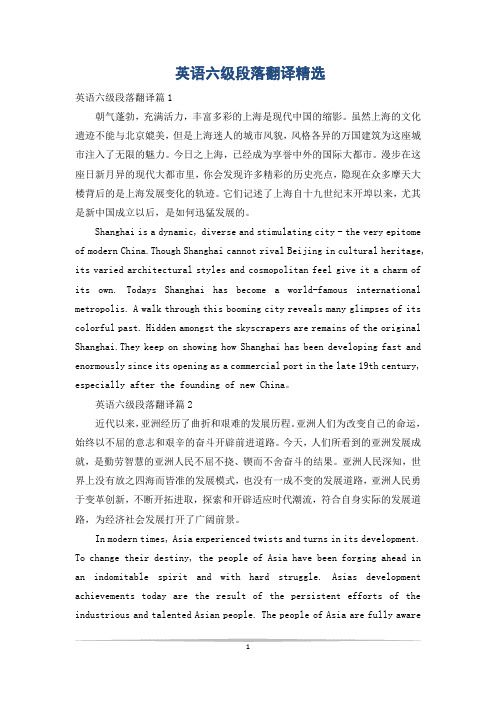
英语六级段落翻译精选英语六级段落翻译篇1朝气蓬勃,充满活力,丰富多彩的上海是现代中国的缩影。
虽然上海的文化遗迹不能与北京媲美,但是上海迷人的城市风貌,风格各异的万国建筑为这座城市注入了无限的魅力。
今日之上海,已经成为享誉中外的国际大都市。
漫步在这座日新月异的现代大都市里,你会发现许多精彩的历史亮点,隐现在众多摩天大楼背后的是上海发展变化的轨迹。
它们记述了上海自十九世纪末开埠以来,尤其是新中国成立以后,是如何迅猛发展的。
Shanghai is a dynamic, diverse and stimulating city - the very epitome of modern China.Though Shanghai cannot rival Beijing in cultural heritage, its varied architectural styles and cosmopolitan feel give it a charm of its own. Todays Shanghai has become a world-famous international metropolis. A walk through this booming city reveals many glimpses of its colorful past. Hidden amongst the skyscrapers are remains of the original Shanghai.They keep on showing how Shanghai has been developing fast and enormously since its opening as a commercial port in the late 19th century, especially after the founding of new China。
英语六级真题翻译范文(优选3篇)

英语六级真题翻译范文第1篇I have a kind mother. Here, let me use the _language_ camera to take a picture of her!She has a pair of big eyes and double-fold eyelid. Tilted slightly under the nose of a severe mouth, is not tall. Mother\'s hand is very rough, because dad on a business trip in the outside, mum do all the chores. Such as cleaning, washing clothes and so on, her hand how does not become rough? Rough hands it doesn\'t matter, however, when her hands gently pat when I fell asleep, will also bring me warm, let I drifted into sleep.At ordinary times mom to my learning method is very concerned about. No matter how busy, she will carefully check my homework, I won\'t do topic she would teach me patiently. If the homework careless, she often remind me, want me to be careful. She comforted me: _you are also pretty good, get rid of this trouble, would be much good._ Listen to the mother, I told myself, must correct the flaws of this careless. Summer, mom know I study very tired, you take me to travel, see the world, I have learned many knowledge outside.Because I love my mom, so I know, mom, mom is of concern to me, so I am proud of I have a good mother.参考翻译我有一个慈祥的妈妈。
大学英语六级翻译练习附参考范文
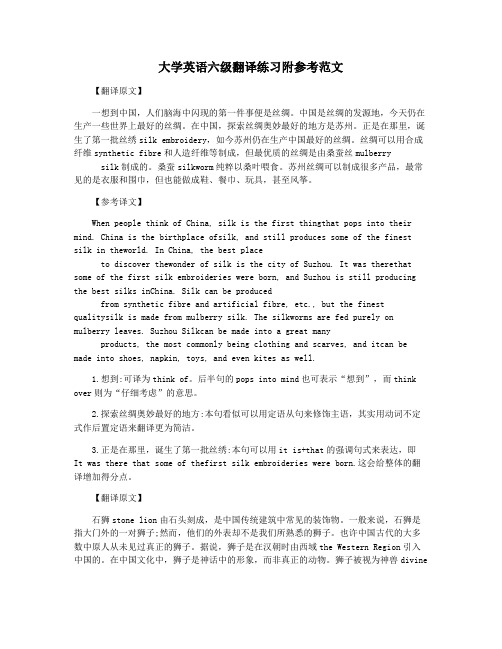
大学英语六级翻译练习附参考范文【翻译原文】一想到中国,人们脑海中闪现的第一件事便是丝绸。
中国是丝绸的发源地,今天仍在生产一些世界上最好的丝绸。
在中国,探索丝绸奥妙最好的地方是苏州。
正是在那里,诞生了第一批丝绣silk embroidery,如今苏州仍在生产中国最好的丝绸。
丝绸可以用合成纤维synthetic fibre和人造纤维等制成,但最优质的丝绸是由桑蚕丝mulberrysilk制成的。
桑蚕silkworm纯粹以桑叶喂食。
苏州丝绸可以制成很多产品,最常见的是衣服和围巾,但也能做成鞋、餐巾、玩具,甚至风筝。
【参考译文】When people think of China, silk is the first thingthat pops into their mind. China is the birthplace ofsilk, and still produces some of the finestsilk in theworld. In China, the best placeto discover thewonder of silk is the city of Suzhou. It was therethat some of the first silk embroideries were born, and Suzhou is still producing the best silks inChina. Silk can be producedfrom synthetic fibre and artificial fibre, etc., but the finest qualitysilk is made from mulberry silk. The silkworms are fed purely on mulberry leaves. Suzhou Silkcan be made into a great manyproducts, the most commonly being clothing and scarves, and itcan be made into shoes, napkin, toys, and even kites as well.1.想到:可译为think of。
5年六级翻译真题及参考译文2017-2021

2021年6月六级翻译真题及参考译文第1套:海南省海南是仅次于台湾的中国第二大岛,是位于中国最南端的省份。
海南岛风景秀丽,气候宜人,阳光充足,生物多样,温泉密布,海水清澈,大部分海滩几乎全年都是游泳和日光浴的理想场所,因而被誉为中国的四季花园和度假胜地,每年都吸引了大批中外游客。
海南1988年建省以来,旅游业、服务业、高新技术产业飞速发展,是中国唯一的省级经济特区。
在中央政府和全国人民的大力支持下,海南将建成中国最大的自由贸易试验区。
Hainan Island is the second largest island in China after Taiwan Island and is the province located in the southernmost part of China.Hainan Island has beautiful scenery,pleasant climate, abundant sunshine,diverse creatures,dense hot springs and clear sea water.Most of the beaches are ideal places for swimming and sunbathing almost all year round.Therefore,it is known as China's all-season garden and resort,attracting a large number of tourists domestic and overseas every year.Since Hainan was established as a province in1988,its tourism,service and high-tech industries have developed rapidly.It is the only provincial special economic zone in China.With the strong support of the central government and the people of the whole country,Hainan will become China's largest pilot free trade zone.第2套:青海青海是中国西北部的一个省份,平均海拔3000以上,大部分地区为高山和高原。
六级满分作文范文附翻译

六级满分作文范文附翻译英语六级写作部分一直是制约学生获取高分的瓶颈,要想打破这个瓶颈就要多学习满分作文的写作技巧。
下面店铺为大家带来六级满分作文范文附翻译,欢迎大家学习。
六级满分作文范文:获取信息爆炸的方法As a famous saying goes, “A wealth of information creates a poverty of attention”. Nowadays we are in the Information Age. Some people keep complaining about distraction by the information explosion.正如一句名言所说,“一种丰富的信息创造了注意力的贫乏”。
如今我们在信息时代。
有人不停地抱怨信息爆炸。
Admittedly, the new information age has brought us so much convenience that we are allowed to get enough information just with a simple click sitting in front of the computers. Nevertheless, we are also confused, annoyed, distracted and upset by an incredibly large quantity of information. For example, when searching for something online, people are easily carried away by irrelevant information and forget their original plan. Besides, some information often turns out to be useless and actually advertisement. Therefore, it can be time-consuming and troublesome to search information online.不可否认的是,新的信息时代给我们带来了如此多的便利,我们可以得到足够的信息,只是用简单的点击坐在电脑前。
(完整版)英语六级翻译
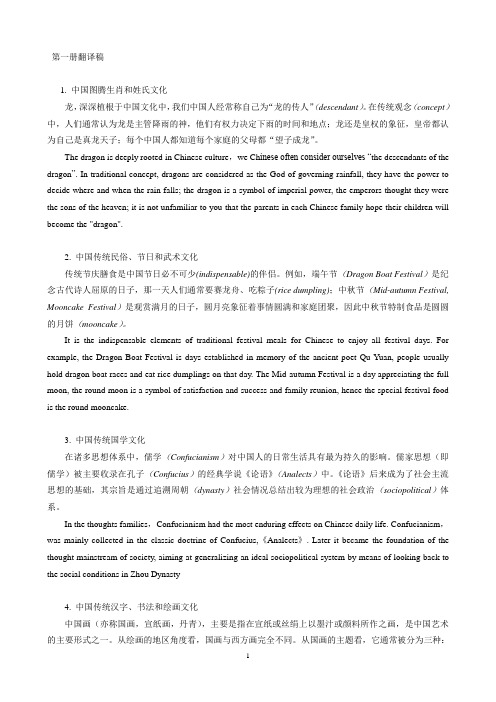
第一册翻译稿1. 中国图腾生肖和姓氏文化龙,深深植根于中国文化中,我们中国人经常称自己为“龙的传人”(descendant)。
在传统观念(concept)中,人们通常认为龙是主管降雨的神,他们有权力决定下雨的时间和地点;龙还是皇权的象征,皇帝都认为自己是真龙天子;每个中国人都知道每个家庭的父母都“望子成龙”。
The dragon is deeply rooted in Chinese culture,we Ch inese often consider ourselves “the descendants of the dragon”. In traditional concept, dragons are considered as the God of governing rainfall, they have the power to decide where and when the rain falls; the dragon is a symbol of imperial power, the emperors thought they were the sons of the heaven; it is not unfamiliar to you that the parents in each Chinese family hope their children will become the "dragon".2. 中国传统民俗、节日和武术文化传统节庆膳食是中国节日必不可少(indispensable)的伴侣。
例如,端午节(Dragon Boat Festival)是纪念古代诗人屈原的日子,那一天人们通常要赛龙舟、吃粽子(rice dumpling);中秋节(Mid-autumn Festival, Mooncake Festival)是观赏满月的日子,圆月亮象征着事情圆满和家庭团聚,因此中秋节特制食品是圆圆的月饼(mooncake)。
6级英语模板作文带翻译

6级英语模板作文带翻译Title: The Importance of Learning English。
As the world becomes increasingly interconnected, the ability to communicate in English has become an essential skill. In this essay, we will explore the significance of learning English and the benefits it brings to individuals and society.随着世界变得日益相互连接,英语沟通能力已经成为一项必不可少的技能。
在这篇文章中,我们将探讨学习英语的重要性以及它给个人和社会带来的好处。
To begin with, English is the most widely spoken language in the world. It is the official language of over 50 countries and is used as a second language by millions of people. As a result, proficiency in English opens up a world of opportunities for individuals, both in terms of personal and professional development. For example, being able to speak English fluently can enhance one's chances of landing a better job, studying abroad, or even traveling to different countries with ease.首先,英语是世界上使用最广泛的语言。
英语六级近年作文及翻译(推荐5篇)

英语六级近年作文及翻译(推荐5篇)第一篇:英语六级近年作文及翻译2009年12月Should Parents Send Their Kids to Art Classes?Nowadays, many parents send their children to various art classes, where the kids are expected to learn how to paint, dance, sing or play musical instruments.Some people firmly support these parents.Since the competiton among the kids for places in famous primary schools and middle schools is fierce, they see an artistic talent of the kids as an entra advantage in the competition.Furthermore, they claim, even if the kids do not do well in art, the art learning experience may prove useful for their future life.However, others seriously doubt this.They complain that, for those kids who do well in art, art classes have taken up so much of their leisure time that many are leading a very stressful childhood.For those who have no interest in such classes, they are just a waste of time.In my opinion, parents should encourage their kids to take art classes but at the same time have anopen mind about this issue.If the kid is keen on art,art classes are sure to be the first choice.But if the kid hates it,he should not be forced to take them.写作模板: Some people firmly support (现象).(支持的第一个理由)Furthermore, they claim,(支持的第二个理由)。
英语六级作文带翻译

英语六级作⽂带翻译英语六级作⽂范⽂带翻译(通⽤11篇) 写好作⽂不是⼀件⼀蹴⽽就的事情,阅读⾃然是必不可少的环节。
下⾯是⼩编整理的英语六级作⽂范⽂带翻译,欢迎阅读! 英语六级作⽂带翻译篇1 It is believed that the computer is bringing the world into a brand new era. At the time the computer was invented, scientists, marveling at its calculating speed, felt that they had created a miracle. Nowadays, the function of the computer is no longer confined to calculation; it permeates peoples daily lives and has become an inseparable part of human society. 它被认为是计算机将世界带⼊⼀个崭新的时代。
在计算机被发明的时代,科学家,惊讶于它的计算速度,觉得他们已经创造了奇迹。
如今,计算机的功能已不再局限于计算,它渗透于⼈们的⽇常⽣活,成为⼈类社会不可分割的⼀部分。
People become so heavily dependent on computers that it is hard to imagine the life without computers. Therefore, some people are worried that “The real danger is not that the computer will think like man, but man will think like the computer.” ⼈们变得如此依赖于计算机,很难想象没有电脑的⽣活。
英语六级翻译原文及答案

英语六级翻译原文及答案英语六级翻译原文及答案英语六级翻译对于很多人来说都是难点,为了帮助大家备考英语六级翻译,店铺整理了一些原文及参考答案,希望能帮到大家!英语六级翻译原文【1】随着中国经济的蓬勃发展,学汉语的人数迅速增加,使汉语成了世界上人们最爱学的语言之一。
近年来,中国大学在国际上的排名也有了明显的提高。
由于中国教育的巨大进步,中国成为最受海外学生欢迎的留学目的地之一就不足为奇了。
2015年,近四十万国际学生蜂拥来到中国学习。
他们学习的科目已不再限于中国语言和文化,而包括科学与工程。
在全球教育市场上,美国和英国仍占主导地位,但中国正在迅速赶上。
参考译文:As China’s economy booms, there is a dramatic increase in the number of people learning Chinese, which makes it become one of the most popular languages. In recent years, international ranks of Chinese universities have apparently boosted. Owing to the progress of Chinese education, it is not odd that China has become one of the most favorite destinations for oversea students studying abroad. In 2015, around four hundred thousand international students piled into China to study. What they learn is no more limited to the subjects of Chinese and Chinese culture, they also learn science and engineering. In the global education market, America and Britain still play dominant roles, while China is catching up.英语六级翻译原文【2】农业是中国的一个重要产业,从业者超过3亿。
- 1、下载文档前请自行甄别文档内容的完整性,平台不提供额外的编辑、内容补充、找答案等附加服务。
- 2、"仅部分预览"的文档,不可在线预览部分如存在完整性等问题,可反馈申请退款(可完整预览的文档不适用该条件!)。
- 3、如文档侵犯您的权益,请联系客服反馈,我们会尽快为您处理(人工客服工作时间:9:00-18:30)。
原文中国新年是中国最重要的传统节日,在中国也被称为春节。
新年的庆祝活动从除夕开始一直延续到元宵节(the Lantern Festival),即从农历(lunar calendar)最后一个月的最后一天至新年第一个月的第十五天。
各地欢度春节的习俗和传统有很大差异,但通常每个家庭都会在除夕夜团聚,一起吃年夜饭。
为驱厄运、迎好运,家家户户都会进行大扫除。
人们还会在门上粘贴红色的对联(couplets),对联的主题为健康、发财和好运。
其他的活动还有放鞭炮、发红包和探亲访友等。
参考答案Chinese New Year is the most important traditional Chinese holiday. In China, it is also known as the Spring Festival. New Year celebrations run from Chinese New Year’s Eve, the last day of the last month of the lunar calendar, to the Lantern Festival on the 15th day of the first month. Customs and traditions concerning the celebration of the Chinese New Year vary widely from place to place. However, New Year’s Eve is usually an occasion for Chinese families to gather for the annual reunion dinner. It is also traditional for every family to thoroughly clean the house in order to sweep away ill fortune and to bring in good luck. And doors will be decorated with red couplets with themes of health, wealth and good luck. Other activities include lighting firecrackers, giving money in red envelopes, and visiting relatives and friends.难点精析1.庆祝活动:译为celebrations即可,考生要注意,不要看到“庆祝活动”就想在celebration的后面加上:• activities。
2. 有很大差异:译为…vary widely,此句还可以翻译为…are rather different。
3.驱厄运、迎好运:译为sweep away ill fortune and to bring in good luck,此处的“驱”如果考生无法译出: : sweep away,也可以用简单的get rid of来表达。
4.大扫除:译为thoroughly clean the house。
5.放鞭炮、发红包:译为 lighting firecrackers, giving money in red envelopes。
放鞭炮还可以用 set off ' I firecrackers或 fire firecrackers 来表达。
原文:中国是世界上最大的发展中国家,人口约占世界总人口的22%。
在过去相当长的时期里,由于诸多原因,贫困一直困扰着中国。
20世纪80年代中期,中国农村绝大多数地区凭借自身的发展优势,经济得到快速增长,但少数地区由于经济、社会、历史、自然等方面的制约,发展相对滞后。
中国政府在致力于经济和社会全面发展的进程中,在全国范围内实施了以解决贫困人口温饱问题为主要目标的有计划、有组织的大规模扶贫开发,极大地缓解了贫困现象。
参考答案China is the largest developing country in the world and its population accounts for about 22 percent of the world’s total. For a long period of its history, China has been plagued by poverty for various reasons. In the mid-1980s, the economy of an overwhelming majority of the rural areas in China grew dramatically by virtue of their own advantages, but a small number of areas still lagged behind because of the constraints of their economic, social, historical, and natural conditions. The Chinese government, while working on all-round economic and social development, has nationwide implemented a large-scale program for development-oriented poverty relief in a planned and organized way. With the main objective of helping poverty-stricken people solve the food and clothing problems, this program has gone a long way toward alleviating poverty.原文北京有无数的胡同(hutong)。
平民百姓在胡同里的生活给古都北京带来了无穷的魅力。
北京的胡同不仅仅是平民百姓的生活环境,而且还是一门建筑艺术。
通常,胡同内有一个大杂院,房间够4到10个家庭的差不多20 口人住。
所以,胡同里的生活充满了友善和人情味。
如今,随着社会和经济的飞速发展,很多胡同被新的高楼大厦所取代。
但愿胡同可以保留下来。
参考答案In Beijing, there are numerous hutongs. The life of common people in hutongs brings endless charm to the ancient capital, Beijing. The hutong in Beijing is not only the living environment of common people but also a kind of architecture. Usually, there is a courtyard complex inside hutong, with rooms shared by 4 to 10 families of about 20 people. Therefore, life in hutongs is full of friendliness and genuine humanity. Nowadays, with rapid social and economic development, many hutongs are replaced by new tall buildings. I hope hutongs can be preserved.难点精析1.带来了无穷的魅力:翻译为bring endless charm to。
2.汉语习惯于用并列的散句或短语来表达一个语境,而英文习惯上用整句表述,句内不太重要的信息会用介词短语或从句来补充说明,如本段中“胡同内有一个大杂院,房间够4到10个家庭的差不多20口人住”是:两个并列关系的汉语短句,翻译成英文时可将第二句用with介词结构表达出来,起补充说明的作用。
3.充满友善和人情味:翻译为full of friendliness and genuine humanity。
4.随着社会和经济的飞速发展:翻译为with rapid social and economic development,也是with介词短语的应用,在句中作伴随状语。
原文:要了解中国文化,就应该对中国的戏曲文化有所了解。
中国地方戏种类很多,其中京剧是一个具有代表性的剧种。
作为一个独立的剧种,京剧的诞生大约是在1840年至I860年。
京剧是在吸收其他地方戏营养的基础上形成的。
京剧有明确的角色分工;在念白上用北京方言;在音乐上以胡琴为主要伴奏乐器。
由于京剧是在融合各种地方戏之精华的基础上形成的,所以它不仅为北京的观众所钟爱,也受到全国人民的喜爱。
参考答案To understand the Chinese culture, you have to know something about the Chinese opera culture. In China, there are many kinds of local operas, among which Peking Opera is a representative one. As an independent opera form, Peking Opera was approximately born between 1840 and I860. Peking opera originated from absorbing the essentials of other local operas. In Peking Opera there is a clear division of roles; the spoken parts are in Beijing dialect; and huqin, is the main accompaniment instrument. Since Peking Opera has combined the cream of various local operas, it is enjoyed not only by Beijing audience, but also by people all over the country.难点精析1.要了解中国文化,就应该对中国的戏曲文化有所了解:该句没有给出明确的主语,因而在翻译时要注意:增译主语you。
